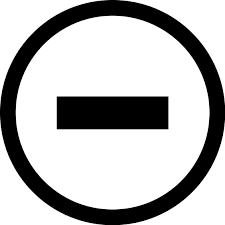negative
英 [ˈneɡ.ə.tɪv]
美 [ˈneɡ.ə.t̬ɪv]
- adj. [数] 负的;消极的;否定的;阴性的
- n. 否定;负数;[摄] 底片
- vt. 否定;拒绝
使用频率:

记忆方法
记住“negative”可以将其与“neg”(否定前缀)和“ative”结合。想象一个不断向下移动的云(“neg”),它遮住了太阳,带来了阴郁的氛围,从而联想到否定的概念。这样,“negative”就与“负面的”或“否定的”含义联系起来。
以上内容由AI生成, 仅供参考和借鉴
中文词源
negative 负的,负极的,消极的
来自negate,否定。引申义负的,负极,消极的等。
英语词源
- negative
-
negative: see renegade
- negative (adj.)
- c. 1400, "expressing denial," from Old French negatif (13c.) and directly from Latin negativus "that which denies," from negat-, past participle stem of negare "deny, say no" (see deny). Meaning "expressing negation" is from c. 1500; that of "characterized by absence" is from 1560s. Algebraic sense is from 1670s. The electricity sense is from 1755.
Negative Capability, that is when a man is capable of being in uncertainties, Mysteries, doubts without any irritable reaching after fact and reason. [John Keats, letter, Dec. 21, 1817]
Related: Negatively. - negative (n.)
- late 14c., "a prohibition; absence, nonexistence; opposite," from Old French negatif and directly from Latin negativus (see negative (adj.)). Meaning "a negative statement" is from 1560s. As a response, "I refuse, disagree, no," from 1945. Meaning "a negative quality" is from 1640s. In mathematics, "a negative number," from 1706. Photographic sense first recorded 1853.
权威例句
- 1. So far 57 have taken the test and all have been negative.
- 到目前为止,参加测试的有57人,测试结果均呈阴性。
- 2. Seventy-nine voted in the affirmative, and none in the negative.
- 79人投赞成票,没有人投反对票。
- 3. Stimulate the site of greatest pain with a small negative current.
- 以微弱负电流刺激疼得最厉害的部位。
- 4. The weakest students can end up with a negative score.
- 最差的学生可能会以负分收场。
- 5. It's just one of those words that's got so many negative connotations.
- 这只是那种有太多负面含义的词之一。
